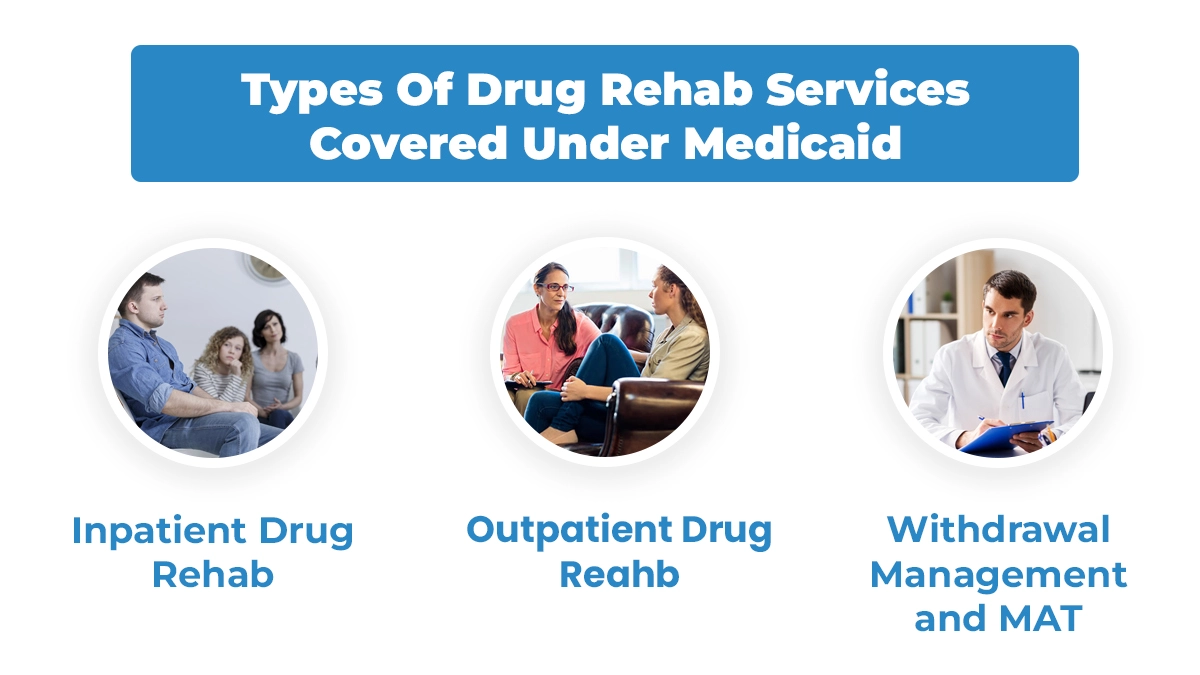
Does Insurance Cover Suboxone Treatment Costs
Explore the basics of insurance coverage for suboxone treatment in this guide from The Recovery Team-Newton.

Medicaid plays a vital role in providing healthcare coverage to low-income individuals, including those seeking drug rehabilitation services. While coverage specifics may vary by state, Medicaid typically includes substance abuse treatment provisions, encompassing various rehab forms.
Additionally, eligibility criteria and limitations may apply. This article will serve as a valuable guide for individuals seeking information about Medicaid coverage for drug rehab.
Many low-income individuals in the United States depend on state-sponsored aid for treatment. Here is what you will learn:
The Recovery Team-Newton offers comprehensive addiction treatment plans tailored to different needs. Connect at (508) 978-2772 to learn more.
Medicaid is a joint federal and state program in the United States that provides health coverage to millions of individuals, including children, pregnant women, adults, seniors, and people with disabilities. Here’s an explanation of how Medicaid works and who it covers.
Medicaid was established in 1965 as a federal and state partnership program under Title XIX of the Social Security Act. It was designed to provide healthcare coverage to financially handicapped individuals and families who otherwise could not afford it.
Initially focused on covering specific categories such as children, pregnant women, individuals with disabilities, and seniors, Medicaid has evolved over the years. Its scope has expanded to include more comprehensive coverage and eligibility criteria, allowing states to expand coverage under the Affordable Care Act.
Medicaid typically covers various healthcare services for financially struggling individuals and families. These services include doctor visits to primary care physicians and specialists and hospital care encompassing inpatient stays, surgeries, emergency room visits, and outpatient procedures.
Preventive care, such as vaccinations, screenings, and check-ups, is also covered to promote overall wellness. Prescription drugs prescribed by healthcare providers are generally included in Medicaid coverage, along with maternity care covering prenatal, labor, and postpartum services for pregnant women.
Substance abuse rehabilitation is a process crafted to help individuals overcome addiction to drugs or alcohol and lead a healthier, more fulfilling life. Below is a breakdown of critical aspects to understand about substance abuse rehabilitation.
Drug Rehabilitation, often called drug rehab, is a process aimed at treating individuals struggling with substance use disorders. There are various types of drug rehab programs, including outpatient and inpatient treatment, medication-assisted treatment, group therapy, and cognitive-behavioral therapy.
Drug rehab is crucial for individuals battling substance use disorders as it provides structured addiction treatments in a supportive environment. These treatments, offered in specialized rehab centers, help individuals liberate from the cycle of addiction, regain control over their lives, and rebuild relationships. Moreover, drug rehab centers offer assistance to underprivileged families, ensuring that everyone has access to help.
Medicaid generally covers substance use disorder treatment for eligible beneficiaries. Beneficiaries with low incomes may qualify for low-cost or free treatment programs. While Medicaid insurance can help offset costs, limitations exist compared to private insurance plans.
Medicaid typically covers a range of alcohol and drug rehab services, including that often extend to mental health care as well. Coverage may vary by state, and individual needs and preferences can influence the treatment approach.
Some Medicaid beneficiaries may access support groups as part of their treatment plan, though the availability of specific services may differ depending on the state’s Medicaid program.
While Medicaid insurance covers substance use disorder treatment, including alcohol rehab, there are limitations to consider. Individual states’ Medicaid programs may influence coverage, and specific treatments or services may not be fully covered.
Additionally, Medicaid beneficiaries may face restrictions on the number of treatment sessions or duration of treatment. Private insurance plans sometimes offer more comprehensive coverage options for substance abuse rehabilitation compared to Medicaid.
Accessing drug rehab with Medicaid involves several steps, but it’s certainly possible. Check out this general guide on how to go about it.
To qualify for Medicaid coverage for drug rehab, individuals must satisfy certain eligibility requirements set by the federal government. These requirements often include income level, citizenship status, and residency. Additionally, individuals must demonstrate a need for substance abuse treatment, such as alcohol addiction or other substance use disorders.
Medicaid covers various treatment approaches, including outpatient and mental health services, provided by treatment facilities and providers. Eligibility is determined based on income levels typically below the federal poverty level.
Applying for Medicaid coverage for drug rehab involves several steps. First, individuals must gather necessary documents such as proof of income, citizenship, and residency. Next, they should contact their state’s Medicaid office to inquire about the application process. Applications can be completed online, by mail, or in person.
It’s necessary to provide accurate information and specify the need for substance abuse treatment. Once approved, individuals can seek treatment at Medicaid-approved treatment centers, including those affiliated with American Addiction Centers.
The specific services covered may vary somewhat from state to state due to differences in Medicaid programs, but generally, the following types of drug rehab services may be covered:
Inpatient drug rehab is a type of treatment for alcohol addiction covered by Medicaid health insurance. It’s an essential thing for those seeking alcohol treatment, especially if they need intensive care. The extent of coverage may vary, so it’s crucial to check with your local Medicaid office. These critical recovery services may include evidence-based inpatient drug and mental health rehab.
Outpatient drug rehab is another type of alcohol addiction treatment covered by Medicaid health insurance. It’s a type of treatment where patients can live at home while attending therapy sessions and receiving medication-assisted therapy. Medicaid may cover the costs of cognitive behavior therapy and other behavioral health services.
Withdrawal management and medication-assisted therapy are critical components of alcohol addiction treatment covered by Medicaid health insurance. This type of treatment helps individuals manage withdrawal symptoms and cravings through the use of medication and therapy sessions. Medicaid may cover the costs of early intervention and provide access to a helpline for support.
Using Medicaid for drug rehab has both benefits and drawbacks, which can vary depending on individual circumstances and the specific program or facility involved.
Medicaid covers substance abuse services as part of essential health benefits, aiding those with limited incomes. Its benefits have expanded further after the Affordable Care Act. In addition, federal guidelines require Medicaid to cover services for mental health conditions, including opioid use disorder.
Medicaid may limit the length of time it covers rehab or the duration of inpatient treatment. The average cost of inpatient stays might exceed what Medicaid covers, leading to financial strain for some individuals. Additionally, not all treatment facilities accept Medicaid, which narrows the options.
If Medicaid does not cover your drug rehab, there are several alternatives you can explore. It’s essential to thoroughly research and inquire about these alternatives to find the option that best fits your needs and financial situation.
If Medicaid doesn’t cover your drug rehab, private insurance might be an option. Check your current health insurance plan for details on coverage. Private drug rehab programs may offer comprehensive recovery programs that suit your needs. Private insurance can help alleviate some of the costs of inpatient drug rehabilitation treatment.
Consider out-of-pocket payment or financing options if you cannot rely on insurance programs. While it may seem daunting, many facilities offer payment plans to help spread out medical expenses. Additionally, financial resources are available, such as loans or assistance programs, to lend a helping hand during this rough patch.
If you struggle to cover the costs of drug rehab, explore scholarships and grants. Some organizations provide financial aid specifically for individuals seeking rehabilitation treatment. Alcoholics Anonymous and other similar organizations might offer scholarships or assistance programs. Research available texts or online resources for potential scholarships or grants that could ease the burden of paying for rehab.
Are you tired of feeling trapped in the cycle of drug and alcohol addiction, struggling to find a way out? At The Recovery Team-Newton, we understand your pain and are here to help you break free.
Our day treatment offers intensive support to build coping mechanisms in a structured environment; meanwhile, our outpatient program provides flexibility, enabling you to receive ongoing care.
In our medication-assisted treatment, we integrate FDA-approved medications with therapy to alleviate cravings and withdrawal symptoms, facilitating a smoother recovery process.
Contact us at (508) 978-2772 to start a journey towards lasting sobriety.
Medicare covers inpatient rehabilitation facilities (IRFs) for beneficiaries who need intensive rehabilitation following an illness, injury, or surgery. IRFs offer specialized care, including drug treatment and case management, to help patients regain functionality.
Medicare typically covers IRF services at a lower cost than other inpatient care settings. These facilities must meet federal program standards to be eligible for reimbursement. Medicare covers physical therapy, occupational therapy, and speech-language pathology services in IRFs. However, Medicare does not cover long-term stays, custodial care, or services unrelated to rehabilitation, such as foster care.
People typically pay for rehab through a variety of avenues. Many individuals use private health insurance plans provided by insurance companies, which may cover all or part of the costs depending on the plan. Outpatient services may be more affordable than inpatient treatment and are often covered by insurance.
Some treatment providers offer sliding scale fees based on income, making rehab more accessible. Additionally, Medicaid, available to eligible low-income individuals in individual states, may cover rehab for Medicaid recipients. In cases of severe mental health issues requiring medical supervision, Medicaid eligibility may extend to cover necessary treatment expenses.
Affording rehab can be challenging, but there are ways to help. First, check if your health insurance covers rehab costs. Some policies do, so it’s worth asking. If you don’t have insurance, consider government-funded programs or sliding-scale fees based on your income.
Saving money by cutting unnecessary expenses can also help. Additionally, consider fundraising or seeking financial aid from charitable organizations or rehab centers. Lastly, outpatient services can be more affordable than inpatient programs. Remember, seeking help is essential, so don’t let financial concerns stop you from getting the support you need.

Explore the basics of insurance coverage for suboxone treatment in this guide from The Recovery Team-Newton.

Explore the effectiveness of medication-assisted treatment with The Recovery Team-Newton.

Explore the examples of dual diagnosis and its treatment plans for better outcomes with The Recovery Team-Newton.